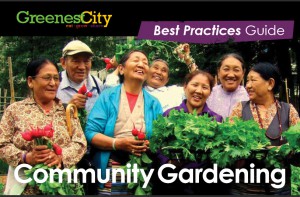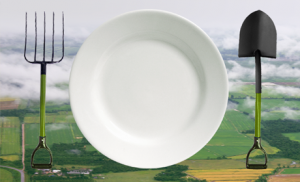Food Factsheet
Canada’s food system is a large and complex economy, directly providing one in eight jobs, employing 2.1 million people and accounting for 8.0% of total GDP. There are, naturally, huge issues with respect to the conservation of farmland, soil quality, water conservation, and pesticides that are part of the sustainable management of Canadian agriculture, as well as major issues regarding animal welfare, the genetic modification of crops, and the quality of food delivered to consumers.
There are many challenges with feeding a nation – three meals a day plus snacks – consistently and affordably. We make choices, as individuals and as a nation, and not all of them are the best ones.
If there is a common cause within this turmoil it is to reconnect people with their food. Farmers who decry the so-called “cheap food policy” in Canada find added value in promoting the benefits of local and sustainably produced food. People working on health issues, new Canadians, and community development have all found community food projects to be one of the greatest community building tools available.
From a policy perspective, the more people are engaged in growing, harvesting, cooking, or fine dining, the more aware they are of where their food comes from and the importance of maintaining a strong and sustainable food system in Canada.
Food Resources
Here are some of the best organizations, ideas, and projects that you can adapt and adopt into your own community or as part of a regional local food strategy.
This page contains ideas for local food, and examples from across Canada. New ideas and links are welcome — contact us
Provincial / Regional Action
1. Organize for change — create regional strategies for local food
Food Secure Canada is a a Canada-wide alliance of civil society organizations and individuals collaborating to advance dialogue and cooperation for policies and programs that improve food security in Canada and globally.
Sustain Ontario is a province-wide, cross-sectoral alliance that promotes healthy food and farming. Sustain takes a collaborative approach to research, policy development, and action by addressing intersecting issues related to healthy food and local sustainable agriculture. Sustain Ontario is working toward a food system that is healthy, ecological, equitable, and financially viable.
2. Protect prime farmland
Most provinces have legislation and zoning in place to control the development of agricultural land — but as Statistics Canada reports, we are still losing prime farmland at a prodigious rate. Over half of the Canada’s Class 1 agricultural land is in southern Ontario, where more than 11% has been lost to urbanization. A good planning act will contain policies to protect farmland but it does little to remove the development pressure. A more proactive approach is required.
There are several examples of greenbelts around major urban areas – with varying degrees of success. One of the more recent efforts, and the most proactive is the Ontario Greenbelt (covering the Greater Toronto and Hamilton Area) The provincial government passed a Greenbelt Act in 2005 and established a Greenbelt Foundation to promote local food and economic opportunities while protecting the agricultural and natural features of the greenbelt. There is also an active citizen’s network, the Greenbelt Alliance which works to promote strong municipal plans and t0 protect the region from inappropriate development.
3. Promote local food
Provincial campaigns can help promote and celebrate local food, which is now officially defined to include food grown within provincial boundaries. One of our favourite campaigns is the Prince Edward Island’s PEI Flavours which features local celebrity chef, Michael Smith, a directory of local foods, special events and a 10-10-10 promotional campaign.
4. Establish food co-ops
Whether local or regional, a food co-op can help connect communities and local farmers. One of the biggest and most successful is the Ontario Natural Food Coop, whose membership includes both natural food retailers and local buying clubs. A short instructional video, courtesy of Live Green Toronto, is available at right.
At the neighbourhood level, a community co-op will usually combine a retail location with community workshops and outreach programs. Karma Co-op in Toronto is one of the oldest, and the West End Food Co-op in the Parkdale area is bringing food services to low-income and new Canadians.
5. Promote organic agriculture
There are several organizations across Canada that help promote organic food, including the Canadian Organic Growers, the Organic Trade Association, and the Organic Federation of Canada. There is also a National Organic Week. Provincially, there is the Ecological Farmers of Ontario, and the Organic Food Council of Manitoba.
COG has a great project underway, called Growing Up Organic, the purpose of which is to shift Canada towards increased organic production by increasing the amount of organically grown food served in Canadian institutions. Started in 2007, they are seeking to expand the project nationally.
GMOs
A key issue of concern is the prevalence of genetically-modified organisms (GMOs) in Canadian farming and food. Organic foods must be GMO-free, and there are programs to certify and label foods as being GMO free, including the Non GMO Project out of the U.S.
In Canada, responsibility for approving “novel foods” rests with Health Canada and the Canadian Food Inspection Agency, which bases their approvals on the principle of substantial equivalence. Labelling of GMOs is done through a voluntary guideline.
6. Promote vegetarian food
The debate around meat vs vegetables will no doubt continue for some time yet. Individual motives for becoming vegetarian include health, morals, and money — but there is no denying the benefits of vegetarian cuisine. One of the best programs is the Veggie Challenge, an international project run by the Toronto Vegetarian Association. The challenge is to go a week on a vegetarian diet – and they will e-mail you recipes.
7. Certify Commitment
So, at the end of the day, how do we know that the food we eat has been grown locally and sustainably? There are a number of certification programs and labels, especially around organic produce, but the best overall program has been developed by Local Food Plus, which certifies both farmers, institutions, and grocery stores as providers of local and sustainably grown food. Now a nation-wide organization, LFP combines a rigourous certification process with consumer-friendly marketing.
Community Action
1. Establish community gardens

Oh, pardon the pun, but they are cropping up everywhere. Community gardens are a wonderful convergence of community-building, access to good food, and environmental benefits. No wonder so many abandoned or under-used lots are being turned into community gardens.
And if you don’t have a plot of land, or live in an apartment, you can look into container gardening as an alternative.
Resources:
- Greenest City best practices guide to community gardening
- Get Growing Toronto (Live Green Toronto)
2. Grow your own fruits and veggies
From raised beds to backyard gardens, finding space to grow some food is pretty easy, and your local hardware store will have all you need to get started. Here’s some of the interesting projects and organizations that provide special services to local gardeners.
LEAF: they are a tree group, but that includes fruit and nut trees as well, and they will plant a tree in your yard for you. This is a service that started in Toronto and has expanded to other municipalities in southern Ontario.
Not Far From the Tree: Okay, so you have a tree but don’t have time to pick the fruit. Enter Not Far from the Tree, who will send volunteers to your house to pick the fruit, split the harvest 1/3 with you, 1/3 for the pickers, and 1/3 for a local food bank. They work out of the Greater Toronto region. In Vancouver, call up the Vancouver Fruit Tree Project Society, which has run a volunteer fruit harvesting program since 1999.
3. Host community workshops
Community workshops are a great way to get people involved in cooking, canning, and preparing good food on a budget. The West End Food Co op in Toronto runs regular canning workshops and canning companies like Bernardin (Canada) and Ball (U.S.) have online resources to get you started.
4. Establish farmer’s markets
Here’s a national website of local markets across Canada. There are provincial sites for Manitoba -the Farmers’ Markets Association of Manitoba – and Ontario – Farmers’ Markets Ontario, as well as local websites for major urban centres across Canada:
Local Food Strategies
Agriculture falls both under federal and a provincial jurisdiction, so we need to look at both levels of government for leadership in promoting local, healthy food. And since food services and public health are a municipal responsibility, you’ll also find a number of progressive municipal food strategies as well.

1. National
The People’s Food Policy Project a pan-Canadian network of citizens and organizations, set up over 30 years ago, that is creating Canada’s first food sovereignty policy. In 2011, they released Resetting the Table: the People’s Food Strategy, which covers many of the points above.
The Canadian Federation of Agriculture has also written a strategy paper, Towards a National Food Strategy for Canada, which includes a section on a sustainable food system.
2. Provincial
In Ontario, Sustain Ontario produced a great report Menu 2020: Ten good food ideas for Ontario. The ideas are:
- Support Producers of Locally Consumed Fruit, Vegetables, and Meats
- Make Room for New Farmers and Alternative Markets within the Supply-Managed System
- Harvest the Whole Value of Ecological Services from Agriculture
- Plant Urban Ontario
- Implement a School Food Program, and Embed Food Literacy in theCurriculum
- Support Community Food Centres
- Establish Local Food Infrastructure through Regional Food Clusters
- Expand Public Procurement of Local, Sustainably Produced Food
- Link Good Food with Good Health
- Plan for the Future of Farming and Food
The Ontario government recently introduced a Local Food Act and has established a Local Food Fund.
3. Municipal
Toronto and Vancouver are two municipalities that are developing local food strategies.
- Vancouver Food Strategy: a plan to create a just and sustainable food system for the city. It builds on years of food systems initiatives and grassroots community development, considering all aspects of the food system, from seed to table to compost heap and back again.
- Toronto is working towards a food strategy. Cultivating Food Connections: Toward a Healthy and Sustainable Food System for Toronto (PDF) proposes a new vision for Toronto, one that unites health and city building. The Toronto Food Policy Council (TFPC) was a key player in the development of a food strategy for Toronto.
Make good food part of our culture
This is the fun part. As food is essential to life, so too is good food essential to a good life.
Not much more needs to be said here, other than to celebrate life with good food, be it at home, at your local restaurant, or at neighbourhood and cultural events.
